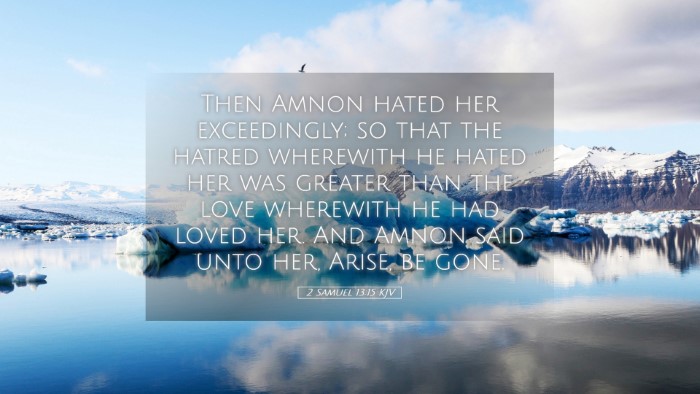Commentary on 2 Samuel 13:15
The verse 2 Samuel 13:15 states:
"Then Amnon hated her exceedingly; so that the hatred wherewith he hated her was greater than the love wherewith he had loved her: and Amnon said unto her, Arise, be gone."
This profound and tragic moment in the life of Amnon and Tamar opens a window into the complexity of human emotions and relationships, woven intricately throughout the biblical narrative.
Contextual Analysis
To fully appreciate the depth of this verse, one must consider the overall narrative found in 2 Samuel 13. This chapter recounts the story of Amnon, the son of King David, who becomes infatuated with Tamar, his half-sister. The tragedy of lust and the subsequent hatred that Amnon develops for Tamar provide a rich ground for theological reflection and moral discourse.
Insights from Public Domain Commentaries
1. Matthew Henry's Commentary
Matthew Henry observes that Amnon's feelings evolve dramatically from lust to hatred. He notes that
"there is often a great deal of folly and wickedness in the desires of men; they pursue what they ought not to desire, and when they obtain it, they are distasteful to it."
Henry highlights the nature of sinful desires—how they can lead to actions that ultimately result in disgust and self-loathing.
2. Albert Barnes' Notes on the Bible
In his commentary, Albert Barnes emphasizes the destructive power of unchecked lust. He states that Amnon's “lust was a passion unsatisfied, becoming hatred when fulfilled.” Barnes suggests that such transformative hatred is born from the realization that what was desired didn’t fulfill the inner void, leading to deeper remorse and chaos. This internal conflict marks a critical point in the human experience, illustrating the emptiness that follows sin.
3. Adam Clarke’s Commentary
Adam Clarke provides a psychological perspective on Amnon's behavior, suggesting that his love was, in reality, lust, which is inherently selfish. Clarke implies that true love respects and honors the beloved, while lust objectifies and ultimately destroys the object of desire. He states, "When the desire is gratified, it is common for the mind to recoil with greater violence against that which has given it dissatisfaction." This notion is vital in understanding the nature of Amnon's emotional turmoil.
Theological Reflections
The narrative surrounding 2 Samuel 13:15 serves as a cautionary tale about the nature of desire, sin, and their consequences. The dangerous interplay between lust and hatred reflects broader theological themes regarding the human condition and the moral law established by God.
1. The Nature of Sin
Sin, as illustrated through Amnon’s actions, often entails a disconnection from God’s design for relationships. Lust leads to actions that not only violate the sanctity of God’s creation but also culminate in profound personal loss.
2. The Consequences of Unbridled Passion
The transition from love (or lust) to hatred exemplifies the volatile nature of unchecked passion. Matthew Henry clarifies that
"Sin begets sin, and once a man is ensnared by lust, it leads to deep-seated hatred and violence." This consequence is significant for discussions on morality and ethics within pastoral settings today.
3. Redemption and Restoration
Although the narrative ends tragically for Tamar, it also opens the discussion about the need for redemption and reconciliation within families and communities. Forgiveness and healing are essential themes that can be drawn from the text, encouraging modern readers to seek restoration even amidst adversity.
Lessons for Today
For contemporary pastors, theologians, and students, the lessons derived from this passage include:
-
The Importance of Guarding the Heart:
It is vital to guard one's desires and passions, ensuring they align with God's truth to prevent the chaos that comes from unchecked lust.
-
The Call for Accountability:
The events in 2 Samuel 13 emphasize the necessity for accountability in relationships, particularly within families and the church.
-
The Need for Compassion:
Understanding the psychological implications of sin can foster a more compassionate approach to individuals struggling with similar issues.
Conclusion
In summary, 2 Samuel 13:15 offers an intricate perspective on the dangers of lust and the overwhelming impact of sin. When examined through the lenses of biblical commentary, the narrative reveals profound truths about human nature, the consequences of actions, and the ultimate need for redemption and healing. The insights from Henry, Barnes, and Clarke collectively encourage a more profound investigation into the complexities of our desires and relationships, calling for a return to God’s designed order in interpersonal connections.


